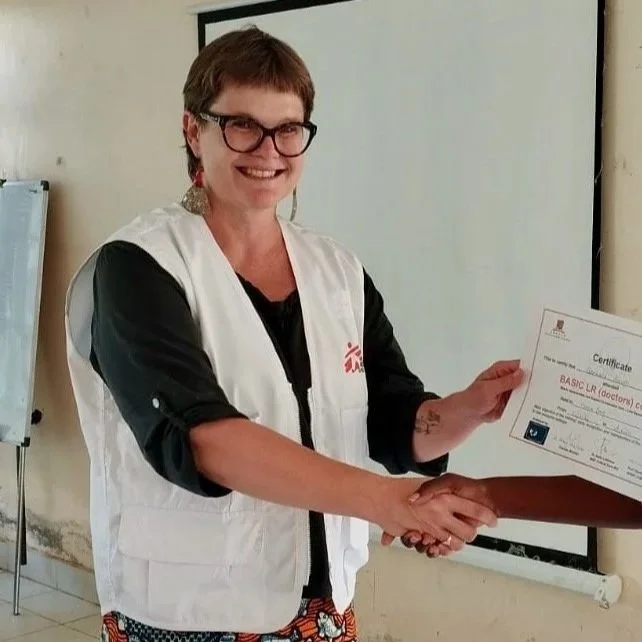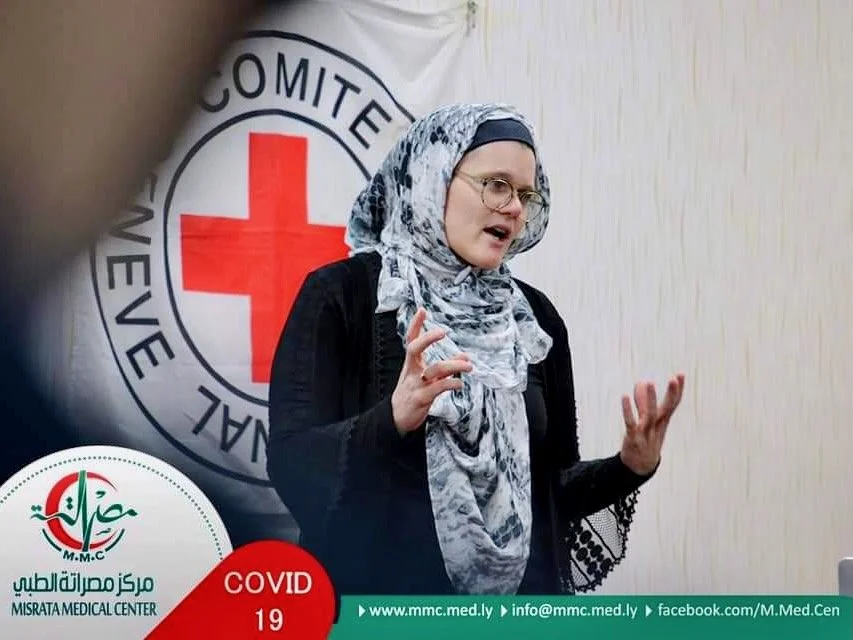International Week of Science and Peace: Dr Amy Neilson
For International week of science and peace Women’s Global Health Australia is proud to launch another special profiling series to highlight the incredible work of women using science to promote peace. This week builds awareness for the interplay between scientific endeavour and the promotion of peace.
Committee member Prof Jaya Dantas interviewed Dr Amy Neilson, a rural emergency doctor focussed on humanitarian aid.
Tell us a little bit about yourself, your role and the journey you undertook to work in the intersection of gender and health.
The focus of my work and career is humanitarian medicine. Locally in Australia I have worked as a rural medicine specialist for nearly 20 years, and internationally I have worked in humanitarian healthcare for 10 years. More recently I have also worked as a lecturer and course co-coordinator for a University of Sydney subject, Humanitarian Crises and Refugee Health while continuing to do some shorter humanitarian jobs. At the end of the year I will be commencing a 7-month role with MSF (Doctors without Borders) in Sudan as the project medical referent for MSF Switzerland’s work in Al Gedaref.
As a clinician and a public health professional who has worked extensively in remote, austere places with limited resources, I have witnessed many challenges faced by women and those of other marginalised genders in healthcare and in disaster more broadly.
What is the favourite thing about what you do?
In terms of any ongoing clinical role, the deep joy of what I do is being able to be with people in authentic and sometimes raw moments; to be able to help them navigate solutions to health crisis and find ways forward. There is something about the extraordinary trust that is required in healthcare that is a privilege that honestly continues to flaw me daily.
Beyond that, these days I do a lot of teaching and mentoring and am moving more into a management role. I have always been a big picture thinker and I seek to reckon with policy and programming in a way that sits with the same values that matter to me as a clinician, which are about navigating trust, privilege and power in a manner that – I hope – respects the person receiving care in each moment.
Could you tell us a little bit about the challenges you faced that brought you on this journey and how you overcame them?
Medical careers in and of themselves can be relentlessly challenging. Rural and remote medicine added a new layer to that from very early in my career. It was difficult to be in towns where I was often the only doctor, in places where people might experience severe medical problems and significant impacts of violence, working long – and often frankly unsafe – hours.
Without a doubt the biggest challenges I have faced working in Australia have been reckoning with the violence that First Nations people experience, particularly when I would see it, over and over and over, presented in our hospitals. This has been violence by police, the Mental Health Act, the health system itself, and violence by partners and others. I witness these injustices as a humanitarian medical doctor on a land that was never ceded. Additionally, my international work has seen many challenges, some of remoteness and some of violence and insecurity.
It is hard to describe so briefly how I manage to work with the impacts of violence. Certainly, the work can be difficult. I work in teams of extraordinary people, I have incredible friends and family, and I accept that there are times when things are hard and we need to pause and regroup.
Another huge challenge is staying away from family for prolonged periods of time, missing them with an ache I can’t describe in a short interview. I think a lot about how to juggle being home and having time with the kids and being away doing things that I hope mean something to them as they get older and see or seek role models for their own lives.
.
What gaps do you see in regards to your work in gender and women in health broadly?
The gaps are enormous in the intersection between race and gender. In terms of my work, it is often the ongoing colonial project of Australia where this is so glaringly important and missed to our deep shame.
Another gap that is very clear to me is the gender bias in research that impacts clinical work. So much is unknown and the care we offer women is affected by that. We absolutely need research to address the needs of women, and again to have an anti-racist lens, for the health of women to improve.
In terms of humanitarian settings and health in conflict in particular – which is the subset of humanitarian action where I mostly work, I see the same problems that exist in our societies at baseline but magnified. If women experience lack of power or agency generally, they often experience even less in times of crisis. I think it matters to develop best practice in every instance clinically and socially, in order that those structures are then available to be replicated in times and places of great needs.
What do you believe are the most pressing issues or priorities for women in global health right now?
The most pressing issue that I see for women in global health right now is the ability to access any health care while under fire. We are living at a time of extraordinary amount of conflict and some of that conflict is clearly genocidal in nature. When I think about Gaza, where I worked last year briefly, I wonder a lot at the silence of a feminist discourse. Women in Palestine – and men, and children – have been killed with such speed and there is such clear evidence of Israeli targeting of civilians in violation of the Geneva Conventions, that it is hard to see anything more pressing than the right to live in the face of genocidal violence. Violence and mortality due to wars is a pressing priority for the health of women globally
How can we encourage others to pursue a career in gender-related health?
I think about gender-related health both as pertaining to the health of women globally, and of being a woman in health. The former is clearly the bigger and more important issue, but the latter is not without challenge and certainly I encourage women and those identifying as other genders to pursue careers in health.
I have learned a lot in recent years about how visibility and voice matter. In the early days of my humanitarian work, it mattered to me to try to write myself out of the story. Navigating my own privilege meant it was important to listen a lot more than speaking. The genocide in Gaza has left me reckoning with what it is to have a voice in some public spaces and how to use that. I have learned that one way we encourage others is to be visible, but also to ensure we are being honest, reflective, and authentic. A colleague told me recently that when she heard me speak at a conference some years ago, where I was telling the story of a very unwell child I sought to retrieve and treat in an incredible remote part of South Sudan – in an exercise that came at great expense to my team and at the end of which the child died – she reflected that she had never before heard someone talk of such fallibility in disaster care. It matters to talk about what is hard about this work. It matters to talk at all, but also to talk of getting it wrong, to reckon with that deep humanity and to continue.
Finally, what are your thoughts about science, health and peace?
We live in a time of such conflict, and it is challenging to reflect on how we might move to a time of peace. Conflict as we know it is driven by multiple factors, rooted within excesses of capitalist extractive industries and weapons manufacturing and sales, racism, violent colonial extremism, neocolonialism, and indeed is interrelated with the climate emergency.
At this point in history, I envisage peace as a process that is likely to come through resistance and struggle. However, there are many roles within that. We need to look at the drivers of conflict, and unpack from there how we might act, through science and through social movements, towards peace and towards the conditions for health for all.



